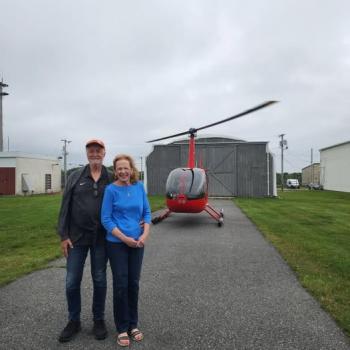The first reading assignment in my General Ethics class this semester was Kate Jennings’ 2002 novel Moral Hazard. I have used it several times in class over the years because it throws the reader headlong into a multitude of moral quandaries and difficulties ranging from sacrificing one’s moral values in order to make money to euthanasia. Cath, the narrator of the novel (and clearly autobiographical in many regards) is happily married to Bailey, a man twenty years her senior who, early in the novel, is showing signs of advancing dementia.
Cath is a freelance writer, a liberal progressive who describes her political and social commitments this way:
Affirmative action, a woman’s right to choose, a judicious redistribution of wealth, parity for everyone in all things. I was against the obvious: capital punishment, egregious pollution, trickle-down economics.
But when Bailey is diagnosed with Alzheimer’s disease, because of financial pressures and increasing medical bills on the horizon Cath uses a connection to get a speech-writing job at a top Wall Street firm. In order to take care of her husband, Cath finds herself in a job that requires her to violate many of her dearest principles on a daily basis. Add this to Cath’s knowledge that Bailey—when he was of sound mind—had frequently expressed that he had no desire to live with diminished capacity, and the stage is set for a smorgasbord of moral dilemmas.
By the end of the novel and many gut-wrenching moral decisions, Bailey is dead, Cath has quit her job, and she has a moment to take stock. This is the place where she will conclude that despite the grief, challenges, and uncertainty it has all been worth it. Right? Think again.
We’re rather keen in this country on learning lessons, as if everything were a test and not just life happening. No pain, no gain—all that bunkum. I could do without the pain, thank you. Big on learning lessons, on self-improvement. And let’s not forget closure. Everything tied up with a neat bow. But what if you don’t learn anything? What if you just put one foot in front of the other?
Contrary to the overworked and thoroughly offensive platitude that “everything happens for a reason,” sometimes things just happen—and there’s nothing redemptive or instructive about it.
Sure, I’ve changed. I’m older. I’m on the other side of fifty, unable to see the point in anything, and lonely as all hell. Try tying that into a neat bow. . . . Actually, I did learn something. The dailiness of life—that’s what gets you through hard times. Putting on your pantyhose, eating breakfast, catching the subway. That’s what stops your heart from breaking.
As we emerge slowly from close to two years of pandemic disruption, inching toward a “normal” that is never going to be same as the pre-pandemic normal, all of us can relate to Cath’s observations with our own stories of disappointment and heartbreak.
Cath’s soliloquy brought to mind something I heard on the “Everything Happens” podcast the other day while out for an early morning walk with Bovina. David Brooks was interviewing Kate Bowler (the host of the podcast) in front of a live audience and mentioned the work of Dan McAdams, a colleague who teaches “story” at Northwestern University. In his research, McAdams asks questions like “How do people narrate their life story?” Although he pays his subjects two hundred dollars to tell him their life story, most of them refuse the money after the interview is over, saying “this is the best afternoon I’ve had in years because I’ve never been asked to tell my life story.”
McAdams noted that the stories he heard were almost always redemption stories. “I was living, something bad happened, I came back better.” As he took his research outside of the United States to global audiences, he would often say in his lectures that people tell redemption stories. The regular response was Americans tell redemption stories. “We don’t tell redemption stories,” he heard. “We tell true stories.” Fair enough.
Last Sunday I met with the Living Stones discussion group, an adult education seminar I have led monthly for more than a decade at the Episcopal church I attend. Over a dozen “Stoners” were in attendance, the most since pre-pandemic at the end of 2019. We have been meeting in person since the beginning of the summer after many months of meeting on Zoom, but this was the first time that almost all of the regulars were present.
We were particularly pleased because Tanya, our new-priest-in-charge who has only been with us since the beginning of this month, joined us for the first time. Our discussion focused on an essay I posted on this blog three weeks ago.
Most of our discussion centered on a beautiful prayer from Nadia Bolz-Weber with which I ended the essay, a prayer that concludes this way:
Lord of compassion, touch us as you did the widow’s son who lay dead and speak those same words to us: “Young man, arise.” “Little girl, get up.”
To those who think they’re not worthy to be loved, who medicate themselves with food and booze and shopping, say “Rise up.”
To us who have been hurt by those who say they follow you, say “Rise up.”
To the proud at heart who think they are not dead, say “Rise up.”
To those who hide their guilt behind good works, say “Rise up.”
To the unloved child who has no idea that one day they will change the world, say “Rise up.”
To the one here today who’s given up, say “Rise up.”
And then, as you did, the son to his mother, give us back to one another and help us to know when we do not have enough compassion for the road ahead, when we do not have enough compassion for our enemies, when we do not have enough compassion for ourselves, that you do. And that it is enough. It is enough for today and tomorrow. And the day after that. It is enough. People of God, it’s enough. Amen.
As each of us shared what “Rise up” means individually, two things became crystal clear. First, each one of us is exhausted, worn out, tired of “trying harder,” of thinking positive thoughts in hopes that they would change something, afflicted with pandemic fatigue, and sorely in need of peace. The last months of disruption, loss, disturbance, and disappointment have not been balanced or overridden by anything we might have learned or gained.
Second, we were so happy just to be together in a place and context that is deeply meaningful to each of us for the first time in almost two years. We had been given back to each other. There’s nothing like being with people you love and trust enough to be transparent and honest. Nothing was solved, but there was healing in the room. As Nadia prayed, “That is enough. It is enough for today and tomorrow. And the day after that. It is enough.”













